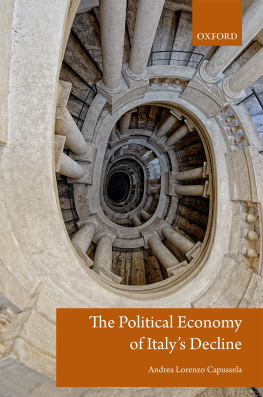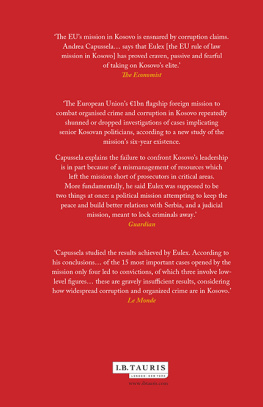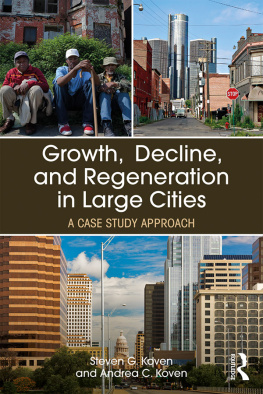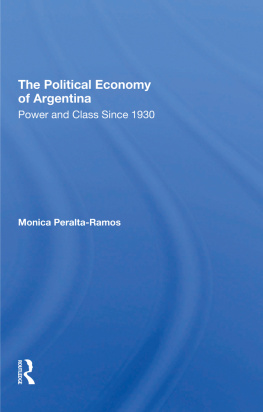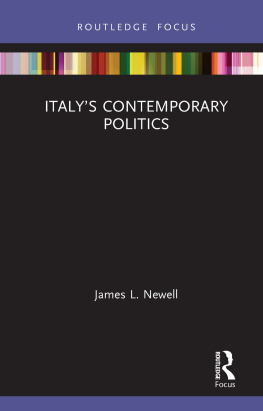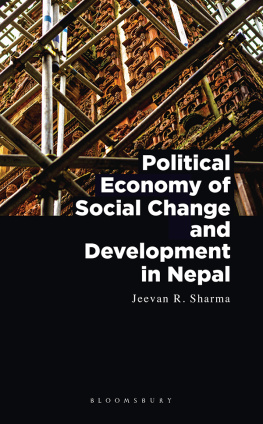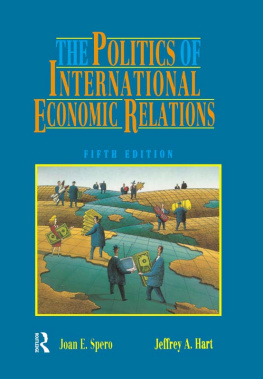The Political Economy of Italys Decline

Great Clarendon Street, Oxford, OX2 6DP, United Kingdom
Oxford University Press is a department of the University of Oxford. It furthers the University's objective of excellence in research, scholarship, and education by publishing worldwide. Oxford is a registered trade mark of Oxford University Press in the UK and in certain other countries
Andrea Lorenzo Capussela 2018
The moral rights of the author have been asserted
First Edition published in 2018
Impression: 1
All rights reserved. No part of this publication may be reproduced, stored in a retrieval system, or transmitted, in any form or by any means, without the prior permission in writing of Oxford University Press, or as expressly permitted by law, by licence or under terms agreed with the appropriate reprographics rights organization. Enquiries concerning reproduction outside the scope of the above should be sent to the Rights Department, Oxford University Press, at the address above
You must not circulate this work in any other form and you must impose this same condition on any acquirer
Published in the United States of America by Oxford University Press 198 Madison Avenue, New York, NY 10016, United States of America
British Library Cataloguing in Publication Data
Data available
Library of Congress Control Number: 2017956382
ISBN 9780198796992
ebook ISBN 9780192517357
Printed and bound by CPI Group (UK) Ltd, Croydon, CR0 4YY
Links to third party websites are provided by Oxford in good faith and for information only. Oxford disclaims any responsibility for the materials contained in any third party website referenced in this work.
To Corrado Stajano, first teacher, through the Eroe borghese, and then friend.
Contents
| CGIL | Confederazione generale italiana del lavoro (Italian General Labour Confederation) |
| DC | Democrazia cristiana (Christian Democratic Party) |
| ECB | European Central Bank |
| EMS | European Monetary System |
| EMU | European Monetary Union |
| ENI | Ente Nazionale Idrocarburi (National Hydrocarbons Agency) |
| EU | European Union |
| GDP | gross domestic product |
| GRECO | Group of States against Corruption, Council of Europe |
| ICT | information and communication technologies |
| IMF | International Monetary Fund |
| IRI | Istituto per la ricostruzione industriale (Institute for Industrial Reconstruction) |
| ISTAT | Istituto nazionale di statistica (National Statistics Institute) |
| NATO | North Atlantic Treaty Organization |
| OECD | Organisation for Economic Co-operation and Development |
| PCI | Partito comunista italiano (Italian Communist Party) |
| PD | Partito democratico (Democratic Party) |
| PDA | Partito dazione (Action Party) |
| PISA | Programme for International Student Assessment |
| PLI | Partito liberale italiano (Italian Liberal Party) |
| PRI | Partito repubblicano italiano (Italian Republican Party) |
| PSDI | Partito socialista democratico italiano (Italian Social-Democratic Party) |
| PSI | Partito socialista italiano (Italian Socialist Party) |
| R&D | research and development |
| TFP | total factor productivity |
| VAT | value added tax |
This book seemed too ambitious an idea. I owe the decision to write it to my conversations within chronological orderCorrado Stajano, Gherardo Colombo, Branko Milanovi (City University of New York), and Gianfranco Pasquino (Bologna, emeritus; Johns Hopkins), and to Adam Swallows encouragement, who at Oxford University Press received the book proposal favourably and supported me throughout.
Tony Barber (Financial Times), Marco Doria (Genoa), Pietro Fioruzzi, Martin Heipertz (German Federal Ministry of Finance), Marco Magnani (Bank of Italy), Guglielmo Meardi (Warwick), Branko Milanovi, Gianfranco Pasquino, Karl Gunnar Persson (Copenhagen), Dani Rodrik (Harvard), Francesco Silva (Milan Bicocca), Zoran Solomun, Adam Swallow, Guido Tabellini (Bocconi), and Renata Targetti Lenti (Pavia) read all or part of the manuscript and gave me comments both careful and insightful, which showed me links I had not seen and implications I had overlooked. Among them I am particularly grateful to my schoolfriend Guglielmo, whose closeness was also a source of confidence. I thank also Gilberto Seravalli (Parma), whose reservations on early drafts of proved stimulating.
Besides many other ones, to Fabrizio Barca I owe a conversation on the strategic choices that underpinned the coalition which governed Italy in 19769. Valerio Onida (Milan, emeritus) shared with me his views on constitutional reforms. Tim Parks (IULM, Milan) translated the passages by Gadda and Calvino that are used as epigraphs, respectively, of the book and of a section of . Guido Rossi (Bocconi, emeritus) discussed with me the resistance he faced in persuading parliament to adopt a modern competition law. Paul Rssler (Regensburg) enlightened me on an aspect of Germanys linguistic history. Enrico Tosti (Bank of Italy) assisted my research on balance-of-payments data. Their help was more important than they probably imagine.
I was equally privileged to have the assistance of Daniele Guariso and Nicol Tamberi, researchers at Sussex University, who prepared all the tables and figures, advised me on the selection of the data to be presented, and conducted the underlying research.
I am very grateful also to Adelphi, Editions Gallimard, and Flammarion, for their kind permission to reproduce the texts that appear in the Epigraph.
I have been greatly aided by two collections of essays, finally, both published by Oxford University Press. One is a history of the Italian economy since 1861, which sets out the results of a research project conducted under the aegis of the Bank of Italy (Toniolo 2013a). The other is a comprehensive analysis of Italian politics since World War II (Jones and Pasquino 2015). As they allowed me also to be parsimonious in quoting from the vast literature they rely upon, I thankfully commend them to the readers who wish to go beyond the often summary remarks that they shall find here.
Levanto, September 2017
De 1450 1650lItalie aux diverses couleurs, clatantes toutes, a rayonn au-del de ses limites propres, et sa lumire sest rpandue travers le monde. Cette lumirese prsente comme la marque dun destin exceptionnel.
[Between 1450 and 1650this Italy of diverse colours, all gleaming, has radiated beyond its own confines, and its light has spread across the world. This lightstands as the mark of an exceptional destiny.]
(Fernand Braudel, 1989)
Latto di coscienza con che nu dobbiamo riscattarci prelude alla resurrezione, se una resurrezione tentabile da cos paventosa macerieil transitus da follia a vita ragionevole non potr farsi se non prendendo elencatoria notizia delle oscure libidini, che hanno scatenato gli oscuri impulsi.

